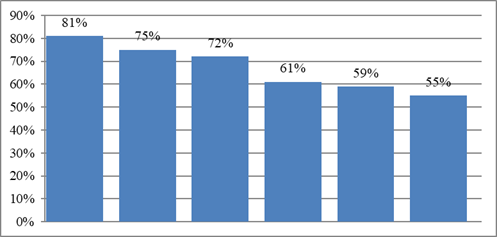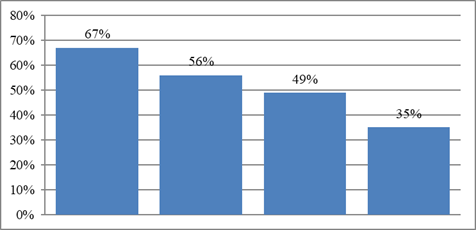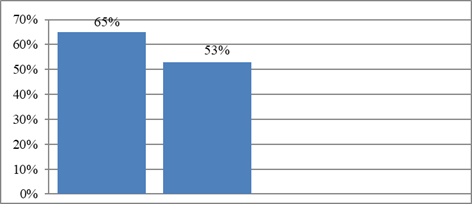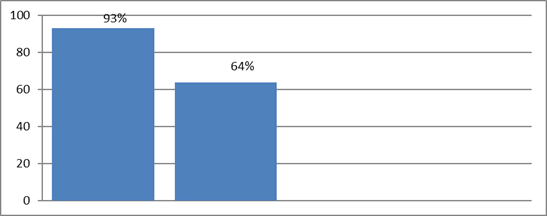Abstract
The article examines how, in the context of global changes, HR specialists in organizations and enterprises integrate technologies into their processes. This helps recruiters to quickly and efficiently carry out the selection and placement of personnel, organize training, adaptation of employees, and evaluate their work. The article also analyzes the main benefits and risks that can be incurred by organizations and enterprises whose recruiters introduce elements of artificial intelligence into their activities. This can be detrimental to both the personnel management process and the organization itself and may also be contrary to the company's management strategy and tactics and market conditions. The paper defines the main directions of ensuring risk minimization and provide a comparative analysis of the use of artificial intelligence by foreign and Russian companies. The authors identified the main achievements and problems in this area by domestic enterprises, ways of using foreign experience. The study also allowed us to conclude that there is a direct connection between the use of artificial intelligence and the level of development of companies, which, in turn, places very serious requirements on the training of specialists.
Keywords: Artificial intelligence, competence model, digital competencies, digitalization, HR, personnel
Introduction
The research topic is quite relevant nowadays, since personnel management is experiencing certain difficulties. In this regard, enterprises are looking for various innovative approaches to personnel management. One of such approaches is the use of AI (Agravale, 2019; Vadinsky, 2018).
The paper identifies the most important areas of personnel management where the use of AI is possible. We are talking about the selection and placement of personnel, training of personnel, their adaptation, job evaluation, etc. The benefits of using AI for recruiters are considered. This means saving time, and better performance of many tasks, and overcoming a few mistakes that human resources management specialists make. To substantiate the need for the introduction of intelligent technologies, the paper provides several examples from the practice of world-famous companies that successfully use AI.
The paper reveals at what level of AI use Russian companies are, what is the attitude of domestic managers to the use of AI. Although most managers of Russian companies see many benefits in using AI, nevertheless, they are in no hurry to implement it, often referring to the risks that the introduction of AI carries. Therefore, soon, domestic managers face the problem of overcoming various barriers that prevent the active use of AI in personnel management.
Based on well-known scientific research, the paper argues that there is a direct connection between the use of intelligent technologies and the level of development of companies. Thus, it was revealed that in companies where revenue growth rates, as their forecast showed, will be measured in double digits in the next five years, 40.6 % of managers around the world are actively implementing AI. In the same companies where the revenue growth rate, according to their own calculations, will be less than 10 %, only 18.5 % of managers expressed their willingness to implement intelligent technologies.
Problem Statement
Personnel management is a purposeful activity of the management staff of the organization, as well as managers and specialists of the departments of the personnel management system, which includes the development of the concept and strategy of personnel policy and methods of personnel management (Kibanov & Zvonnikov, 2010).
One of the main tasks of HR specialists in companies is to hire employees of various specialties. To solve this problem, recruiters must solve a lot of tasks, such as processing resumes, processing accounts and letters of recommendation, and much more, while making mistakes, which is the reason that vacant places can be filled by people who are not suitable for this place. Companies often re-hire an employee. Using AI in this procedure can make the recruiter's work much easier.
Using AI, the HR department can simultaneously receive a large amount of information about each candidate applying for a particular vacant position. In the future, you can also receive information such as evaluating the effectiveness of an employee, which is important for determining his potential. To cope with the solution of such tasks, it will take quite a lot of time for recruiters. They spend 60 % of their time just reading resumes. Recruiters can use AI when conducting interviews with candidates, the final decision of who will take vacant positions (Babkin, 2021).
Companies use various programs to effectively solve this problem. So, SAP has developed the Resume Matcher program, which helps to understand the job descriptions, what skills are required, etc. Moreover, the program has a database that includes several tens of thousands of different anonymous resumes provided by the organization's clients. The program can find fresh resumes that it deems most relevant to the criteria set by the employer.
Entelo offered its approach. The program developed by the company allows specialists to find candidates not based on a resume, but according to the information that is publicly available on the Internet. In the application available in the program, it is possible to note that these candidates are not suitable and indicate the reason, and another time the search settings will be more accurate (Danielyan, 2017).
Viriato has gone even further by developing a program that makes it possible to send messages about the behavior of employees to the company's server. So, it informs about the time during which an employee spends on websites, the time spent by an employee who is not related to his activities in the company, about his attempts to access confidential information, his behavior, which allows us to conclude that the employee intends to quit and leave the company.
The AI analyzes all this information and makes a conclusion about the productivity of the employee and enables recruiters to make correct decisions on personnel issues. For example, a valuable employee who is about to quit is offered a promotion or an increase in salary. Workday Entelo, Microsoft, and IBM have similar AI programs.
Russian companies are also trying to keep up with foreign ones. So, the Russian company Stafory has created a robot "Vera", which is able to quickly analyze information on job portals, select a resume that is suitable for this vacant position, is able to call all applicants, ask everyone questions, conduct video interviews. In addition, Vera can analyze applicants' responses and even determine what their emotions are. The robot "Andrey" performs similar functions. These two robots, for example, have already made more than 5,000 calls to pick up employees for Coca Cola HBC Russia.
In recent years, due to the very rapid development and improvement of technologies, the requirements for training and development of employees have been increasing. For this process to be fast and efficient, organizations are turning to AI and machine learning, which have many possibilities and have a more personalized character. Some companies have already started conducting such experiments (for example, Dell, IBM).
Recently, there has been a lot of talk about the use of the competence model by Russian companies. The competence model should contain such an indicator as the correspondence of the applicant's knowledge to the basic competencies of the digital economy. The task is to form and introduce into the education system the requirements for the basic competencies of the digital economy for each level of education (Kibanov & Zvonnikov, 2010).
To master the necessary competencies and participate in the development of the digital economy, an effective motivation system should be created. This is an individual digital voucher from the state for teaching children and adults the competencies of the digital economy, and benefits for admission to universities, and a system of benefits for companies that train and employ such specialists and a system of intangible benefits for employees (Mustafayeva et al., 2018).
To implement all the above-mentioned tasks, regulatory legal acts should be adopted that ensure the regulation of flexible labor relations, including remote ones, including labor rationing, optimizing the non-productive expenditure of resources (including excessive reporting) and regulating the use of a citizen's personal development trajectory in the process of labor relations (Abasheva, 2020; Tatuev et al., 2016a).
AI's capabilities are huge in the field of fraud protection and compliance. Firstly, the AI can view the organization's network data in a matter of time and determine the area of possible errors and risks. Secondly, AI is dozens or even several dozen times faster than the person himself, can detect financial and other serious violations in the company in a shorter time.
The well-known American bank Wells Fargo fired 5.3 thousand of its employees who were convicted of fraud and he still had to pay a fine of $ 185 million dollars. The bank's employees, without coordinating with customers, opened more than 2 million accounts and 500 thousand credit cards. The management of Wells Fargo Bank, creating a banking system of incentives, did not consider the potential risks that are inherent in it. Namely, the number of issued cards was used to evaluate the efficiency of employees' work, bonuses and salary increases of employees directly depended on this indicator (Danielyan, 2017).
The well-known Rolls Royce company decided to investigate several companies that are scattered around the world. The program spent only a few months on this work, revealing violations of legislation in 12 countries. If ordinary employees were engaged in solving this global task, they would have spent more than one year. According to McKinsey analysts, by 2025, more than 30 % of such checks in companies will be carried out using an AI system. TrustSphere, Keencorp, Volley, Cornerstone, and several other companies have achieved great success in developing such programs.
Research Questions
- To define the transformation of personnel management using modern technology;
- to analyze advantages and problems of introducing artificial intelligence into the management process;
- to show the attitude of managers of different levels of management to the use of AI using the example of Russian and foreign companies;
- to identify the main problems of the slow introduction of modern technologies in Russian companies and the main ways to solve them, using the experience of leading foreign companies.
Purpose of the Study
During the research, the task was to justify the need for the use of modern technologies in personnel management, to consider at what level is the process of using AI in personnel management in Russian companies, to identify problems and ways to solve them.
Research Methods
The functioning of the personnel management system is characterized by a variety of diverse problems that act as a contradiction of management strategy and tactics, market conditions and company capabilities, personnel qualifications, and innovation needs, etc. And each of these problems can be solved in many ways based on the use of AI. During the research, such approaches as aspect, system and conceptual were used. The aspect approach made it possible to choose one facet of the problem according to the principle of relevance or according to the principle of considering the resources allocated for research. So, for example, the problem of personnel development may have an economic aspect, socio-psychological, educational, etc. A systematic approach is an approach to the study of an object as a system in which the elements of internal and external relations that most significantly affect the results of its functioning are identified, and the goals of each of the elements are determined based on the general the purpose of the object. The conceptual approach made it possible to develop research concepts, i.e., a set of key provisions defining the general direction of the study. The main role in the methodology is played by the means and methods of research. The following methods were used in the study: formal-logical, general scientific and specific.
Findings
It should be noted that in the last few years, interest in the use of AI has increased on the part of domestic businesses. In 2019, the profit from various projects using intelligent technologies increased by 63 %. In large companies, AI is successfully used for personnel management and managerial decision-making.
And yet, based on the results of a survey conducted by experts hh.ru we can conclude that the use of AI in personnel management in Russian companies is slow. 800 senior managers from France, Germany, Italy, the Netherlands, Russia, Switzerland, the UK, and the USA took part in the survey (a sample of 100 respondents per country). Large companies with a staff of more than 250 people were considered. The study was conducted in the period from January 18 to 27, 2019 (Khrustalev, 2019).
Thus, only 11 % of companies in Russia use AI in personnel management, 49 % of respondents are only studying this problem, and 40 % of employers noted that they are not interested in this topic at all. At the same time, 33 % are confident that AI will radically change the role of HR in companies soon (Figure 01).

According to the interviewed HR specialists, the changes will affect such areas of their work as interaction with candidates who did not get a job in the company, instead of HR, AI will be engaged in sending refusals with an explanation of the reasons. Also, AI will help HR determine the emotions of a candidate by his face and gestures, assess the applicant on the digital trail, conduct exit interviews before dismissal, replace trainers in digital training, and engage in employee motivation.
Many HR specialists see a lot of benefits in using AI. Thus, 81 % of respondents consider the advantages for HR specialists to be the release of recruiters from routine actions, 75 % of respondents consider the optimization of job search for candidates to be an advantage, 73 % attribute the benefits of using AI to the automation of the process of working with personnel.72 % of respondents consider the advantages of AI to be the ability to significantly reduce the time for collecting and analyzing a large amount of data. 61 % of the advantages of using AI include the possibility of obtaining and using, in addition to resumes, other necessary information about candidates, 59 % of respondents believe that AI becomes an HR partner and the main coordinator of innovations, 55 % believe that the use of AI leads to an increase in labor productivity (Figure 02).
Despite the rather large advantages that AI will bring in personnel management in companies, respondents noted the risks that recruiters will face (Balaganskaya & Chulanova, 2019; Bostrom, 2016). Thus, 67 % of respondents expressed concerns that in the process of making decisions about candidates, the machine will not consider the human factor and emotional intelligence.

Among the risks for the recruiter, some respondents cited the fear that decisions about candidates will be made without considering the human factor and emotional intelligence (67 %), 56 % of respondents noted that AI may pose a threat to those recruiters who are engaged in simple HR operations, as they may lose their jobs. About half of the respondents (49 %) expressed concerns that the introduction of intelligent technologies could lead to mistakes in the candidate selection process, since recruiters do not always understand what the AI criteria are when choosing candidates, 35 % of respondents believe that the introduction of AI will lead to increased competition in the market of HR specialists (Figure 03).
The leaders of Russian companies have not only begun to introduce intelligent technologies into the business sphere, but most of them (65 %) believe that they are ethically responsible for the use of artificial intelligence. Note that the number of foreign business leaders is somewhat smaller, who hold the same opinion (53.0 %) (Figure 04).


The study showed that there is a direct connection between the use of AI and the level of development of organizations. Thus, it was revealed that in companies where revenue growth rates, as their forecast showed, will be measured in double digits in the next five years, 40.6 % of managers around the world are actively implementing AI. In the companies where the revenue growth rate, according to their own calculations, will be less than 10 %, only 18.5 % of managers expressed their willingness to implement intelligent technologies (Figure 05).

The heads of fast-growing companies have not only expressed a desire to introduce intelligent technologies into the business sphere, but also in the very near future (1–3 years): 93.2 % of them set the task of using AI in decision-making. We see a different picture in slow-growing companies, where 64 % of directors will solve it within only 3–5 years (Figure 06). (Khrustalev, 2019).

In the coming years the active introduction of artificial intelligence into various business processes will be an innovative priority for building the concept of sustainable development of socio-economic systems (Babkin, 2021; Tatuev et al., 2016b).
Conclusion
The use of AI in personnel management has advantages and benefits both for recruiters and for the whole company. AI performs tasks such as recruitment, placement and adaptation of personnel, training, and evaluation of personnel, etc. much faster and much better.
Companies that use AI face certain risks: underestimation of the human factor and emotional intelligence, job loss for recruiters, some mistakes in the candidate selection process, increased competition in the market of HR specialists. The task for the heads of companies is to foresee such risks and find methods of managing them.
The study showed that Russian companies lag somewhat behind foreign ones in the use of AI in personnel management. However, there are some successes in solving this problem. Moreover, domestic companies are ahead of their Western counterparts in terms of the pace of AI application.
Analysis of the work of many companies has shown that there is a direct link between the efficiency of companies and their use of intelligent technologies. Thus, it was revealed that in companies where managers are actively implementing AI, the revenue growth rates in the coming years, in their opinion, will be much higher than in those companies where intelligent technologies are poorly implemented.
References
Abasheva, O. Y. (2020). Digital economy and end-to-end digital technologies: modern challenges and prospects for economic, social, and cultural development. Samara.
Agravale, H. G. (2019). Artificial intelligence at the service of the economy. How machine predictions help you make decisions. Mann, Ivanov and Ferber.
Babkin, A. V. (2021). Ecosystems in the Digital Economy: Drivers of sustainable development. POLYTECH-PRESS.
Balaganskaya, V. S., & Chulanova, O. L. (2019). Artificial intelligence in personnel management: opportunities and risks. A new generation, 20, 19–24.
Bostrom, N. (2016). Artificial Intelligence. Stages. Threats. Strategy. Mann, Ivanov and Ferber.
Danielyan, T. (2017). How artificial intelligence helps business. Business Newspaper, 12 Apr.
Khrustalev, M. V. (2019). Russia has outstripped the United States and Europe in the active introduction of artificial intelligence. https://news.microsoft.com/ru-ru/business-leaders-age-of-ai/
Kibanov, A. Y., & Zvonnikov, V. I. (2010). Problems of training in the field of personnel management. Higher educ. in Russia, 10, 19–22.
Mustafayeva, Z. A., Tappaskhanova, E. O., & Alshagirova, D. D. (2018). Innovative approaches in the organization's personnel management. Innovative development of the economy, 3(45), 60–69. http://www.ineconomic.ru/sites//field_print_version/jurnal-3-45.pdf
Tatuev, A. A., Nagoev, A. B., & Shanin, S. A. (2016a). Innovation priorities of building the concept sustainable development social-economic systems of region. Journal of the Social Sciences, 11(10), 2446.
Tatuev, A. A., Tatuev, A. A., Rokotyanskaya, V. V., Moshchenko, O. V., & Shanin, S. A. (2016b). Socially-oriented operating principles of innovation policy in the regional economy. International Business Management, 10(16), 3369–3374. https://medwelljournals.com/abstract/?doi=ibm. 2016.3369.3374
Vadinsky, O. (2018). An overview of approaches evaluating intelligence of artificial systems. Acta informatica pragensia, 7(1), 74–103. DOI: 10.18267/j.aip.115
Copyright information

This work is licensed under a Creative Commons Attribution-NonCommercial-NoDerivatives 4.0 International License.
About this article
Publication Date
25 November 2022
Article Doi
eBook ISBN
978-1-80296-127-0
Publisher
European Publisher
Volume
128
Print ISBN (optional)
-
Edition Number
1st Edition
Pages
1-742
Subjects
Sociolinguistics, linguistics, semantics, discourse analysis, translation, interpretation
Cite this article as:
Tappaskhanova, E. O., Mustafayeva, Z. A., Tokmakova, R. A., Bischekova, F. R., & Khandohova, Z. A. (2022). Transformation Of Personnel Management Using Modern Technologies. In D. Bataev, S. A. Gapurov, A. D. Osmaev, V. K. Akaev, L. M. Idigova, M. R. Ovhadov, A. R. Salgiriev, & M. M. Betilmerzaeva (Eds.), Social and Cultural Transformations in the Context of Modern Globalism (SCTCMG 2022), vol 128. European Proceedings of Social and Behavioural Sciences (pp. 615-623). European Publisher. https://doi.org/10.15405/epsbs.2022.11.84

